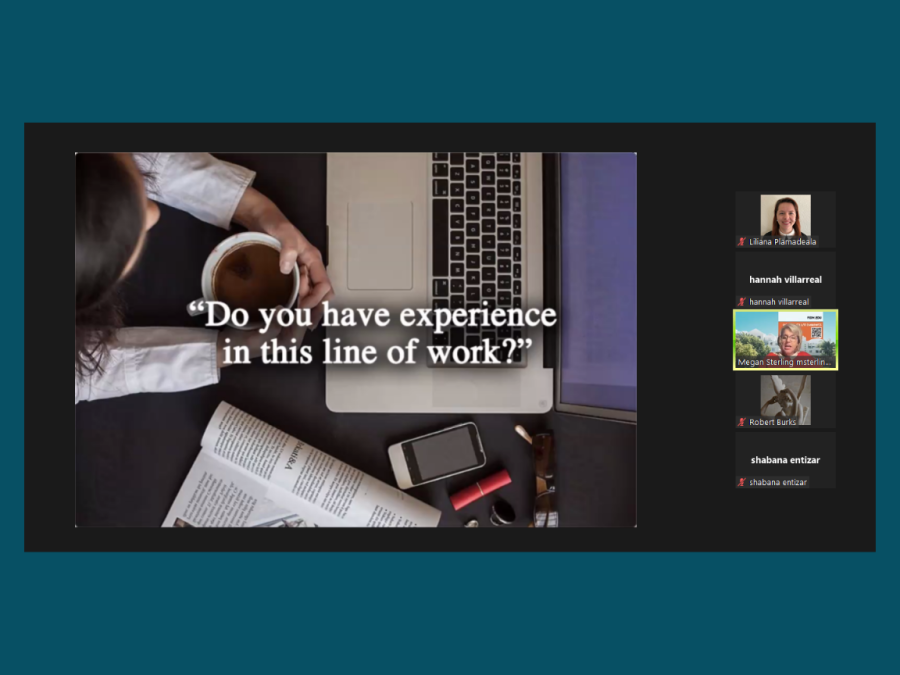Career workshop gives out tips to be successful in an interview
“Ace that Interview” is a workshop, that was held over Zoom, in which the topic of job interviews were discussed. The most asked questions and what to wear to an interview were also talked about.
A career workshop, “Ace that Interview,” was held over Zoom to share tips and advice for students looking to ensure their next interview will be successful.
Megan Sterling, a representative of the Fashion Institute of Design and Marketing, was the speaker at the workshop.
Sterling said that it takes practice for people to be good at interviewing, and preparation is key to a successful interview.
“Interviewing is one of those skills that is a little bit scary because we have to put ourselves out there,” Sterling said. “We have to brag about ourselves and that’s not a normal behavior that we do everyday.”
Sterling went over the top five questions that could be asked during a job interview and how to answer them.
The top five questions that could be asked during an interview were ‘tell me about yourself,’ ‘why do you want this job,’ ‘what are your strengths,’ ‘what are your weaknesses,’ ‘do you have any previous experience in this line of work’ and ‘do you have any questions for me.’
She also explained what type of attitude to have during an interview, what to wear for an interview, grooming tips before an interview, what one’s body language will say during an interview, how to describe any prior working experience and how to speak during an interview.
Sterling said the clothing you wear to an interview is powerful. A basic interview outfit would be pants, a collared shirt and nice shoes.
“I always say go with the things that you know right off the bat,” Sterling said. “I don’t like guys that wear denim or graphic tees, and no baseball hats, vans, tennis shoes or flip flops.”
Being prepared physically prior to an interview is important because that will be the first impression given to an employer when you greet them, but coming prepared with thought-out, concise and specific, answers and doing research about the company is also key.
“When we don’t prepare, what happens is we start saying ‘so,’ ‘right,’ ‘um,’ ‘like,’” Sterling said. “Those are our thinking words and after a while they start to be the only words that the interviewer will hear.”
Coming prepared with answers will allow a conversation to be carried and having knowledge about a company will show an employer the motivation behind an application.
“The purpose of the interview is to see who you are and to see how you’re going to fit into the existing organization,” Sterling said.
Sterling also noted that taking time, about 10 seconds, to gather your thoughts and formulate an answer to a question seems like a long time, but it really isn’t. It is not necessary to jump at answering an interviewer’s questions, and it is better to take a pause.
Sterling suggested that when talking about any prior experience, either using a story or even having a bulleted list is best. Coming prepared with a small note card with your answers to this specific question is best if interviewing makes one nervous and forgetful.
“It shows the interviewer that you want the job, and that you took time to prepare and practice,” Sterling said.
Some grooming tips Sterling gave were that clothing should be lightly ironed prior to an interview, dress conservatively, a level-up from everyday wear and long hair should be pulled back if there’s a habit of playing with it.
Sterling also explained the importance behind body language during an interview.
“Body language is powerful because it sets the tone and the mood,” Sterling said. “They’ve already made a first expression but now they may extend their hand for you to shake.”
She said it’s important to keep your posture, movements and gestures in mind and be cautious throughout the entire interview. For example, slouching is not a good display of positive body language during an interview. Maintaining eye contact is also key.
At the close of an interview, Sterling suggested paying attention to cues indicating the interview is ending and taking the opportunity to ask for the job, reminding the interviewer what you want and are here for.
“Ask for it, say it out loud,” Sterling said. “Say the job you went to the interview for, ask for it, say ‘thank you for your time, I’m really looking forward to being a part of your team and working as an analyst for the financial department.’”
She also said this is the last opportunity to ask any questions you didn’t get to ask previously during the interview.
At the end of her speech, Sterling began answering audience members’ questions from the chatbox.
An audience member asked about an appropriate response to a question about long term goals. Sterling suggested breaking the question down into one year, five years and 10 years.
“Know what your path is,” Sterling said. “In the next year, I will finish my bachelors degree. In five years I would like to be in a managerial role in the field that I studied at school. In 10 years I would like to be here…blah blah blah.”
The workshop concluded with the last couple of the audience member’s questions being answered.
“You will get good at this,” Sterling said. “It’s a lifelong skill that you will learn over and over, and you’ll do it multiple times.”

